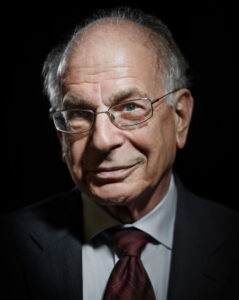Seven hundred attendees sat transfixed at the Westmont President’s Breakfast as they listened to the wisdom of Dr. Daniel Kahneman. Nobel Prize winner in Economics, recipient of the Presidential Medal of Freedom, and bestselling author of Thinking, Fast and Slow, he presented some fascinating perspectives on how individuals and organizations can make more effective decisions.

I will highlight three gems I took away from Dr. Kahneman’s comments. You will find a more complete explanation of these ideas in his incredible book, Thinking, Fast and Slow.
>>Avoiding the Planning Fallacy
Forecasting is a common practice for most individuals, businesses, and nonprofits. Nonprofits estimate their operational budget, businesses calculate completion dates and costs of capital projects, and individuals project home renovation costs. Forecasters often fall prey to unrealistic optimism and inaccurate intuition, failing to consider the experiences of similar projects and potential risks.
Kahneman explains that the problem occurs when optimistic projections are unrealistically close to best-case scenarios and forecasters fail to consult the statistics of similar cases. In fact, he asserts that the common tendency to neglect the statistics of similar cases is perhaps the major source of error in forecasting.
He recommends being disciplined enough to utilize the outside view rather than relying on narrow framing. By considering similar projects and their outcomes we will avoid the trap of overestimating benefits and underestimating costs.
Kahneman offers this example of what he calls the Planning Fallacy: A 2005 study examined rail projects undertaken worldwide between 1969 and 1998. In more than 90% of the cases, the number of passengers projected to use the system was overestimated. Even though these passenger shortfalls were widely publicized, forecasts did not improve over those thirty years; on average, planners overestimated how many people would use the new rail projects by 106%, and the average cost overrun was 45%. As more evidence accumulated, the experts did not become more reliant on it.
>>Beware of the Halo Effect.
Philip Rosenzweig, a business school professor in Switzerland, first addressed this phenomenon in his penetrating book, The Halo Effect. Kahneman explains that if we like something important about someone, we often like everything about them and, similarly, when we don’t like someone we don’t like anything about them. For example, if we don’t like a politician’s viewpoint, we don’t like the way they look or even their voice. If we like the way the CEO of a certain company is running the business, we often like everything about them and assume their business is successful because of their excellent management.
The halo effect can negatively influence our judgment of people and situations because it gives us illusory explanations of events. For example, many people attribute the success of Google to the brilliance of its founders, Larry Page and Sergey Brin, two creative graduate students in the computer science department at Stanford University. The actual facts surrounding Google’s rise to become a giant of the technology industry reveals a significant amount of luck. No one could have predicted their meteoric rise. The halo effect lends a misleading aura of invincibility to the heroes of the Google story.
Too often we assume that “What You See Is All There Is.” Kahneman calls this the powerful WYSIATI rule. He says it is at work in many similar instances. We can’t help dealing with the limited information we have as if it is all there is to know. We build the best possible story from the information available to us, and if it is a good story, we believe it.
Oddly enough, it is easier to construct a coherent story when we know little because there are fewer pieces to fit into the puzzle. Our comforting conviction that the world makes sense rests on a secure foundation: our almost unlimited ability to ignore our ignorance. So, remember to always dig deeper using your critical thinking skills. Don’t assume that what you see is all there is.
>>Knowing How to Use Intuition and Analysis.
Many of us are quick to make decisions based on our intuition. Our “gut” reaction is often accurate; however, this is true only under certain circumstances. The most effective use of intuition in decision-making comes from primarily drawing on skill and expertise acquired by repeated experience. In these situations, the solution to a problem comes to mind quickly because familiar cues are recognized. Examples include chess masters, firefighters, and physicians.
However, just because our intuition serves us well in certain areas does not mean we can rely on it in all situations. When we attempt to use intuition for decisions about topics with which we are unfamiliar, our accuracy declines rapidly. In this instance, simple, statistical rules are superior to intuitive judgments.
Kahneman says he learned the lesson that intuition adds value only after a disciplined collection and analysis of objective information and disciplined scoring of separate traits. He recommends that we not simply trust intuitive judgment—our own or others—but do not dismiss it, either.
For a thorough explanation of Dr. Kahneman’s concepts, be sure to get a copy of his popular book, Thinking, Fast and Slow. Many thanks to Westmont for bringing such a stellar guest to our community. I recommend keeping an eye out for the many Westmont activities in our area.
